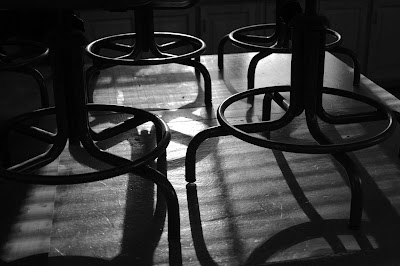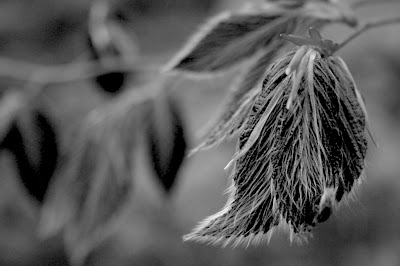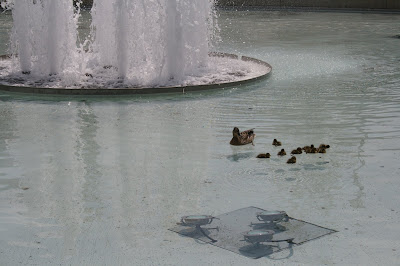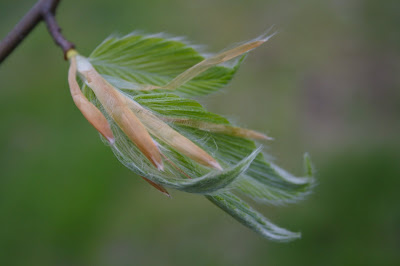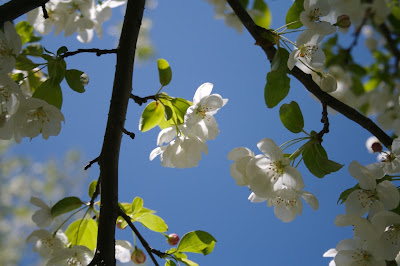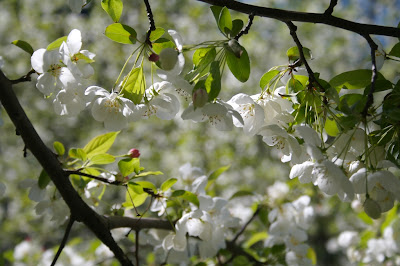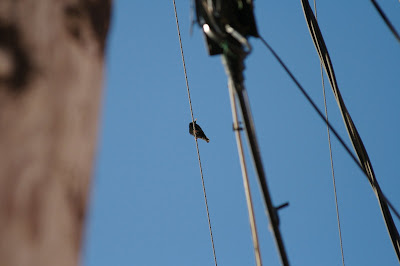
"Are you two in love?" says the six-year-old boy who's nose-high to our booth. The soon-to-graduate student and I laugh out loud. "No," I say, calling the boy by name. "Then why are you sitting together?" he retorts.
Suddenly, it's a conversation that's picked up speed. We are working the logic of children. And this child is a quick one.
Both our bodies bear his handiwork this afternoon, for instance. When I arrived outside the coffeeshop to meet my former student for lunch, he held out his left hand, the back of which bore a green markered flower. "Like my tattoo?" he said. "Where'd that come from?" I replied. He gestured toward the village's six-year-old friend, son of the coffeeshop's owners, where he stood nearby wielding a green marker. This child and his family live around the corner from me. Two falls ago, he and I waded through my raked leaves, back and forth across the front of my yard; last week, he and his brother tackled me repeatedly on the coffeeshop's couch, and he tried to bite my new Superhero necklace, a move which garnered him a mighty and merciless tickling. This child is, in short, one of the best fixtures in my village life.
When he saw me admiring my student's flower tattoo, the child asked whether I wanted one, as well. I assented. "Where do you want it?" he asked. I held out both hands. "Do you want to put it on the hand with the silver ring or the hand wtih the iron ring?" I replied. He paused, then reached for my right arm. The weather was just cool enough today for me to be wearing bracelet-length sleeves, leaving my forearms exposed. That expanse of skin was just the canvas he needed. Taking my right wrist in his left hand, he made a first stroke, putting a point--the tip of an arrow, perhaps?--near the bottom of my sleeve. I pushed my sleeve up, but he pulled it back down: "I'm not going to put anything up there." "I'm just keeping my sleeve out of your way," I said. He proceeded with total, confident absorption. Soon a tall building with a ground-floor door was taking shape. "Is it a house?" I said. "No." "Is it an apartment building?" "No." I guessed as many more tall buildings as I could imagine. As he drew horizontal lines down the front of the pointy-topped structure on my forearm, someone made him laugh and left a bobble partway down.
"Do you know what it is?" he said. "No," I answered.
"It's a lighthouse."
One of my students from the first women's writing course I taught here showed up just then. I showed her my forearm and its six-inch green tattoo. "He has had his vision," I told her. My other student and I went in to order lunch.
And now, ten mintues later, my own personal tattoo artist wants to know whether the boy who wears his flower and the girl who wears his lighthouse are in love.
"We might be in love," I tell him, "but we're not in love with each other."
"I think that you are in love!" he crows.
His mother appears behind me. "He thinks that we're in love because we're sitting together," I say, looking over my shoulder at her; my student is laughing so hard that he can't say anything at all.
She laughs and looks down at her son. "What about you and E.?" she asks him. "You sit together. Are you in love?"
Suddenly things start coming clear: he turns redder and redder; my student regains his voice and says, "Look at that color! Look at him blushing!"; I chime in to say, "Are you in love??" He blushes and blushes and laughs and calls out, "Whatever!" and is ushered away by his laughing mother.
It's one of the day's high points.
For the rest of the day, a six-inch green lighthouse beacons up my arm. It has never occurred to me to get a tattoo on the outside of my forearm, but I find myself enjoying this one's presence immensely. When the time comes, all the green marker sloughs easily off, all but the dark rectangle of the lighthouse's door, which holds fast in the skin stretched over my wristbone.
* * *
 It's not the first time this month that someone has spoken to me about love in a coffee shop. I mentioned Granville Jim last week. A couple of days into May, I drove to Granville, a town about 30 minutes away, to run a discussion on Austen's Emma. All my duties over by 9 a.m., I decided to stop into the village's coffee shop for a coffee and some reading. By 9:15, I had noticed the old man at the table one over and one up from me; it was hard not to notice him because he was staring. I smiled and went back to reading. When I glanced up, he was still staring. I smiled again. A few minutes later, he called over to me, "I hope you get an A in that class!" I laughed and told him that I was teaching that class, and he took the opportunity to ask whether he could join me.
It's not the first time this month that someone has spoken to me about love in a coffee shop. I mentioned Granville Jim last week. A couple of days into May, I drove to Granville, a town about 30 minutes away, to run a discussion on Austen's Emma. All my duties over by 9 a.m., I decided to stop into the village's coffee shop for a coffee and some reading. By 9:15, I had noticed the old man at the table one over and one up from me; it was hard not to notice him because he was staring. I smiled and went back to reading. When I glanced up, he was still staring. I smiled again. A few minutes later, he called over to me, "I hope you get an A in that class!" I laughed and told him that I was teaching that class, and he took the opportunity to ask whether he could join me.
"I'm blind," he explained as he sat down, "and so I have to get really close to a girl to see whether she's pretty." As the conversation moved ahead, it didn't take him long to proclaim me not only pretty but also gorgeous--because of my smarts. (I think it was my getting his joke about the radio announcer who mispronounced "Prokoviev" as "Prokofeef" that did it. "Do you know who Prokofeef is?" he asked. "Sure," I said. "Who was he?" "A Russian composer." "Right! But it wasn't pronounced Prokofeef," he replied. "But I can't teach you anything; you're outsmarting me already!") "Do you know what makes a girl gorgeous?" he asked. "What's that?" I said. "Being smart. Having brains."
Jim and I talked for a good ninety minutes. I stayed around so long, in part, because so many of the stories he told were of his killingly unhappy marriage--and because I could imagine (having just taught a class on Austen, after all) that his wife would have her own lacerating tales to tell. By the time we parted, I knew the makes of all four of his children's cars and where they all live. I knew about his imminent relocation to Granville's retirement community, and his college days, and the time he was supposed to meet up with the woman who might have been the love of his life but then didn't talk to her because she was talking to another guy on the street corner where they were supposed to meet. I knew that he didn't like "this rock and roll music." I knew that he thought any young woman should avoid having a boyfriend with long hair and an earring: "I tell you, look out. He's gender confused." I will admit that he got some points from me for having used the phrase "gender confused."
"What's your maiden name?" he asked me at one point. "Oh, I'm not married," I told him. I don't quite remember how the conversation went from there--nowhere where he had to understand my singular life, though, since he remained convinced to the end that I had a boyfriend somewhere. (He was sure that I am not "gender confused.") Perhaps he offered yet another iteration of his warning against hasty marriage. "Getting married to my wife was the biggest mistake of my life," he told me several times, at one point claiming that he should have had the marriage annulled after three weeks.
Toward the end of our encounter, Jim clarified for himself that I am a teacher. "I would never have thought that I'd fall in love with a teacher," he said. I laughed. In fact, I deliberately let my laugh run its fullest octave. By that point, it had long been clear to me that I was some moment of joy dropped into this sad-seeming stranger's morning. What harm was there in letting it go on? It was difficult to extricate myself, anyhow; ultimately, I had to use the out he offered me when he suggested that my boyfriend was undoubtedly waiting for me to return. "I do actually have to go," I replied. He grasped my right hand in his and held my right wrist in his left hand. "You've made my day," he said.
Had my young friend seen it--this eighty-year-old hand enveloping the wrist and forearm that would come to bear a beacon, on the body of a thirty-one-year-old woman no one else has called gorgeous in years--he would have thought he was looking at love.


















